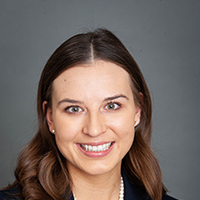 The industry event anyone in secured finance attends now celebrates its 77th year. SFNet is set to make the Arizona convention a memorable one. Click below to register.
The industry event anyone in secured finance attends now celebrates its 77th year. SFNet is set to make the Arizona convention a memorable one. Click below to register.

Lindsey Thiesfeld
Senior Associate, Hilco Diligence Services (HDS
Lindsey Thiesfeld is a senior associate with Hilco Diligence Services (HDS) in Chicago. Lindsey joined HDS in late 2018 as an analyst and was promoted to associate in October 2019 and to senior associate in August 2020. Currently, Lindsey works to manage all aspects of complex domestic and multi-national field exams, and has worked with borrowers based in the UK, Germany and Australia. Lindsey is also highly involved with training and developing new HDS team members.
Lindsey’s asset-based lending diligence experience covers a variety of industries, including manufacturing, transportation, retail, oil & gas, agriculture, and specialty finance. Through her role, she often has the opportunity to work closely with both the lender and the borrower to create and implement solutions that satisfy the requirements of all parties.
Lindsey started her career with the Financial Industry Regulatory Authority (FINRA), where she focused on leveraging transaction-level securities trading data in order to identify potential risks posed to retail investors. Outside of work, Lindsey is highly involved with the non-profit organization America Needs You, serving as a volunteer mentor and a member of the Associate Board working to create economic mobility through professional mentoring for ambitious first-generation college students in the greater Chicago area.
What advice would you offer to women just starting out in the industry?
Don’t be afraid to speak up and ask questions. Also, there is no one “right” way to be a leader. There are quiet leaders and outspoken leaders. There are detail-oriented leaders and big-picture leaders. I feel like women experience a pressure to become more masculine in their communication and management styles in order to be taken more seriously. It has taken me a long time to realize that you can be an efficient, intelligent leader with a smile on your face and a couple of exclamation points in your emails! Find your leadership style and be true to it. Finally, to borrow a phrase I recently learned, “ambition” is not a dirty word. Women are allowed to unapologetically pursue success, set lofty goals, and achieve them.
What do you know now that you wish you knew in the beginning of your career?
I wish I knew that no one has it all figured out, at least not in their twenties! Everyone is constantly just trying their best and learning and adapting every day. Once you realize that, it becomes much easier to navigate any situation professionally and empathetically. Also, you are going to spend a lot of time as the only woman in the room—find a way to make people remember you were there, as well as ways to bring more women with you the next time around. I also wish I knew that staying organized is the most important component of meeting deadlines and being successful. The people who look like they’ve got it all figured out are really just organized.
What do you enjoy most about your role? Least?
My favorite part of my role is the opportunity to work with so many different businesses and clients. Pre-COVID, I loved the business travel and the opportunity to visit different client sites as well, and I love the aspect of continuous learning that is built into the work that we do. No two projects are the same, and I am constantly flexing my problem-solving skills to adapt and respond to the situation at hand. I also enjoy training and mentoring newer colleagues and getting to watch them mature into capable leaders and individual contributors. My least favorite part of my role is the amount of e-mails I get!
How can commercial finance organizations attract and retain more women?
Hire more women, promote more women, and pay women more. Also, women’s issues are everyone’s issues. Men, who historically and currently represent the majority of decision-makers within organizations, need to start caring about gender equity in the workplace as much as their female counterparts do. Diversity is not a zero-sum game, and men do not “lose” when more women succeed. It isn’t the responsibility of a women’s focus group to solve every gender-related problem that exists in corporate culture. Actionable steps to create a more equitable workplace for women: make all salary data public, implement and encourage paid parental leave, and allow flexible work arrangements for all employees.
77th Annual Convention
 The industry event anyone in secured finance attends now celebrates its 77th year. SFNet is set to make the Arizona convention a memorable one. Click below to register.
The industry event anyone in secured finance attends now celebrates its 77th year. SFNet is set to make the Arizona convention a memorable one. Click below to register.
